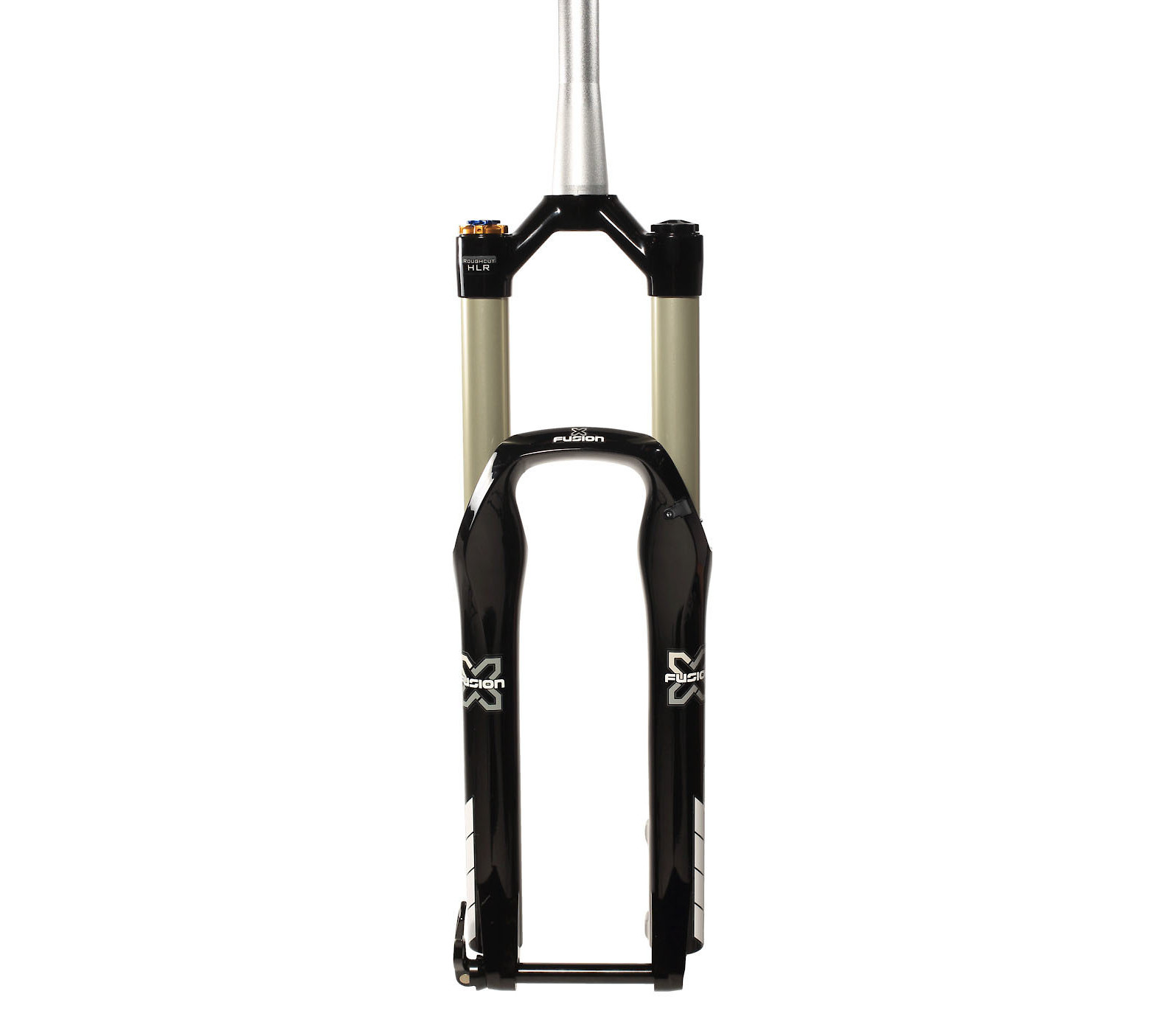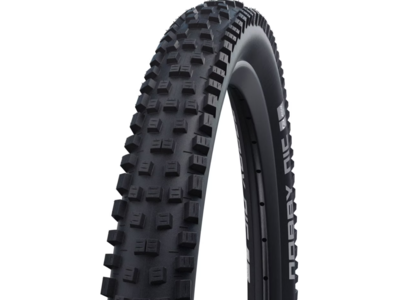X-Fusion Sweep Boost RCP Suspension Fork
| Where To Buy | |||
|---|---|---|---|
Free shipping on orders over $50 (continental U.S. only).
International shipping available. Some exclusions apply. |
|||
Free shipping on orders over $50 (continental U.S. only).
International shipping available. Some exclusions apply. |
|||
Free Delivery on purchases over £20.
|
|||
by Kevin Shiramizu
X-Fusion has been quietly making quality shocks and forks for several years now, and are often spec'd on budget-oriented bikes given their good value. The company has continued to take steps towards producing higher end parts, and the new Sweep fork is their latest development, incorporating a fresh "Roughcut HLR" damper.

X-Fusion Sweep HLR Highlights
- Travel: 160mm (ITA 100-160mm) for 27.5"
- 34mm Stanchions
- Spring Type: Air
- Damping: "Roughcut HLR" cartridge damper with expansion bladder
- External Adjustments: Hi- and Lo-speed compression, rebound
- Axle: LockX 15mm
- Post Mount, Max Rotor Size: 203mm
- Tapered Steer Tube
- Colors: Black or White
- Weight: 4 lb 3.2 oz (1.9 kg)
- Offset: 46mm
- Axle to Crown: 551mm at 160mm of Travel
- MSRP: $749.99 USD
- Availability: May/June 2015
Initial Impressions
Straight out of the box I was surprised by the overall finish quality of the fork. Nothing stood out as "cheap" and there were no glaring cost-cutting issues with the build quality of the fork. I suppose the stickers might be the cheapest aspect of the fork's finish, but if you don't like them, they peel off. In regards to weight, the Sweep came out of the box feeling competitive to the comparable forks from the two bigger companies.

New for 2015 is X-Fusion's "Roughcut HLR" damper, available on all 34mm stanchion forks from the company. An evolution of the previous HLR damper, Roughcut utilizes a fully bled damping cartridge that separates the oil from the air, which in turn is meant to eliminate the consistency issues cavitation can cause when oil and air mix as the suspension cycles.

An elastic bladder accommodates displaced oil, in a system that is similar to RockShox's Charger damper and the FIT cartridge from FOX. If you want the nitty gritty, here's a useful view of the inner workings of the Roughcut damper.

The fork sits at 160mm in the standard setting, and I decided to try this out on my bike meant for less. It only took me 30 seconds down the trail to figure out this was too much travel for my needs. Luckily one of the extra items included with the fork was a tool used for holding the damper rod and dropping/installing the lowers (the retail version of the fork will also include a shock pump and a starnut in the box). The process of changing the travel on the fork is on par with any other fork I’ve worked on in recent years. You can adjust the fork internally by 20mm increments or use spacers to bite off smaller 5-10mm chunks of travel. After a bit of testing, I settled on 140mm of travel and was quite happy with the balance of travel and geometry on my Santa Cruz 5010. The fork has a slightly lower axle to crown than my previous fork, a RockShox Revelation.

Once I got the travel right, I was able to spend more time focused on tweaking the settings, which took a few rides of hiking sections to get dialed. The adjustment knobs were easy to spin and had indents that didn’t leave you wondering if that was a click or not.
On The Trail
It’s hard to not get excited about a new fork and just expect it to slay things right off the bat. Getting your suspension working properly takes a bit of patience however, especially when coming from different brands and starting from scratch. I had set up the fork to be running about 30% sag (standing on the pedals in attack position) initially and was relying on the damper to stay up in the travel, but this approach wasn’t getting me the results I was hoping for. With the softer initial spring rate, I found the fork packing up on successive hits, especially while braking into corners even with the rebound set up quick.
Going back and setting the fork up to more like 20-25% sag with a stiffer spring and running a little less compression damping made for a ride quality better suited to my taste, though still not ideal. With the stiffer spring pressure and less compression damping I was able to have the fork stay up in the travel more effectively most of the time and get a better feeling of control through fast and rough sections up to a moderate pitch.

One thing I could not seem to accommodate in tuning was the tendency for the fork to dive in really steep sections. I ended up with significantly higher spring pressure than when I started and close to the full amount of low-speed compression damping. I only ever veered about 3-4 clicks off from full on, and then typically ended up back at just 1 or 2-clicks out. Even then the fork still dove more than the RockShox Revelation it replaced under hard braking and when pushing into the steeps. Just for the sake of science-ing, I ran a ridiculous pressure (for my weight) in the air spring, and it didn't dive then, but it was also effectively semi-locked out.
We all want lightweight forks that can accommodate anything from the range of steep agro DH to washboard filled braking chatter on public use trails, and as time goes on our expectations continue to grow. Modern trail bikes are set up to handle some nasty stuff, so maybe it’s just that I’m asking a 5-inch bike to do stuff that looked like DH bike territory a few years ago.
The Sweep did its best work on medium hits and was also great at eating up larger, slower hits. It was not as supple on small chatter, but not in a way that felt detrimental to overall ride quality. It just wasn’t where my setup was running best. Overall the fork seemed best suited to moderate terrain typical of most public trails, excelling at not shaking your hands off the bars over washboards.

The Sweep was not significantly different in feel regarding rake/offset compared to my previous setup. I had left plenty of room on the steerer tube to play with stack height while also narrowing in on the travel settings I liked best. Where I ended up at 140mm of travel, the Sweep was shorter than my previous fork by a little bit, but nothing that I couldn't accommodate for by tossing another spacer or two under my stem for my final set up. Any minor handling differences faded away within the first few minutes of the next ride.
Things That Could Be Improved
Out of the box there were a couple of minor issues that I would like to see change in future revisions of this fork. First, the cable guide employs a tiny bolt that never had the guts to wrangle much. It’s nice to not have zip ties for cable management when possible, but the little bolt used for this guide could barely hang on from the start. Sure enough, it was toast the first time my bars spun enough to yank the brake line a bit and then I was back to using a zip tie anyway. The intent is for the plastic guide to remain seated between the guides on the fork, however getting the line to stay put is difficult when the brake line is routed inside the fork, pulling against the guide.

The second issue was that the QR lever for the 15mm axle was shaped in a way that did not allow it to spin past the lowers during wheel installation/removal. The lever is a good shape for opening and closing, but it hits the lower and you end up using half turns to thread the axle in and out. This is a very minor gripe, but anyone who takes their wheel off for transport is going to find this mildly annoying.

As for actual beefs with the fork, I have only one and it’s common to most suspension available from any brand. The need to include such a large range of adjustments for a large range of rider weights and styles means that your personal sweet spot for tuning may be between clicks of adjustment. Having a dozen or 18 clicks of adjustment is great, but not when you find yourself in a situation where four is too soft and five is too harsh. The high-speed compression settings were where I found myself wanting to be between clicks most often.

Long Term Durability
This particular test was only a couple of months long and the first few weeks of that was spent getting travel, spring, and damper settings dialed in. So I was really only able to ride hard for about six weeks on this fork. While I had no issues with it in use, it is not enough time to determine if the Sweep presents any particular durability shortcomings. Aside from the cable guide though, I saw no signs of trouble on the horizon. If you (or your local shop) stay on top of routine maintenance, I don’t see why this fork wouldn’t last you a few great seasons. You’ll probably have to change forks by then due to some new axle standard or wheel size anyway.
What's The Bottom Line?
We want downhill fork performance with cross country weight on trail bikes nowadays so expectations are high all around. I wasn’t blown away by some game-changer of a fork in the Sweep, but it did its job and held its ground pretty well in a market segment that is very competitive. Whether an aftermarket upgrade, custom build fork option, or OE spec, the Sweep is a solid choice for most trail use that proves that one can make a darn good fork at a much lower retail price than other options. If a person on a tight budget can get a fork that works like this in today’s market then things are going pretty well for bike suspension.
More information at www.xfusionshox.com.
About The Reviewer
Kevin Shiramizu has been riding mountain bikes for over 15 years. During that time he accumulated multiple state championships in Colorado for XC and trials riding, a junior national champ title in trials, and went to Worlds to get his ass kicked by euros in 2003. His riding favors flat corners and sneaky lines. After a doozy of a head injury, he hung up the downhill bike for good in early 2010 and now foolishly rides a very capable trail bike with less protection and crashes just as hard as ever. He likes rough, technical trails at high elevation, but usually settles for dry, dusty, and blown out. He spent five good years of his youth working in bike shops and pitched in efforts over the years with Decline, LitterMag, Dirt, and Vital MTB. He also helped develop frames and tires during his time as a guy who occasionally gets paid to ride his bike in a fancy way in front of big crowds of people.
Specifications
Axle to Crown: 551mm at 160mm of Travel
| Where To Buy | |||
|---|---|---|---|
Free shipping on orders over $50 (continental U.S. only).
International shipping available. Some exclusions apply. |
|||
Free shipping on orders over $50 (continental U.S. only).
International shipping available. Some exclusions apply. |
|||
Free Delivery on purchases over £20.
|
|||



























9 comments
Post a reply to: Tested: X-Fusion Sweep HLR